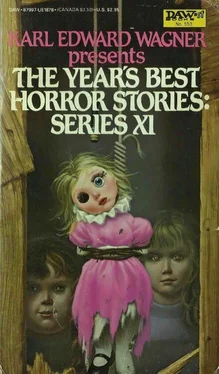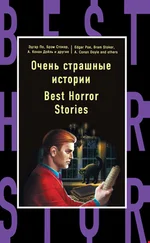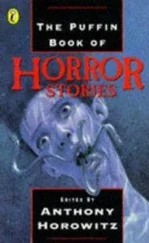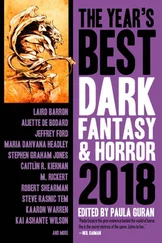“And isn’t there the lady in Sutton who collects bricks from the scenes of crimes? She was meaning to use them to build a miniature Black Museum. She ought to be worth tracing,” Susie said as the man seized the flailing hand by its wrist. “And then if you want to extend the scope of the book there’s the mother of the Meathook Murder victims, who still gets letters pretending to be from her children.”
The man had captured the wrist now. Slowly and deliberately, with a grin that looked pale as a crack in clay, he—Miles was barely able to swallow; his head, and every sound in the restaurant, was pounding. “They sound like good ideas,” he mumbled, to shut Susie up.
Back at her office, a royalty fee had arrived. She wrote him a check at once, as though that might cure him. As he slipped it into his briefcase, she caught sight of the notebooks in which he’d written on the train. “Are they something I can look at?” she said.
His surge of guilt was so intense that it was panic. “No, it’s nothing, it’s just something, no,” he stammered.
Hours later he was walking. Men loitered behind boys playing pinball; the machines flashed like fireworks, splashing the men’s masks. Addicts were gathering outside the all-night chemist’s on Piccadilly; in the subterranean Gents’, a starved youth washed blood from a syringe. Off Regent Street, Soho glared like an amusement arcade. On Oxford Street figures in expensive dresses, their bald heads gleaming, gestured broken-wristed in windows.
He had no idea why he was walking. Was he hoping the crowds would distract him? Was that why he peered at their faces, more and more desperately? Nobody looked at all reassuring. Women were perfect as corpses, men seemed to glow with concealed aggression; some were dragons, their mouths full of smoke.
He’d walked past the girl before he reacted. Gasping, he struggled through a knot of people on the corner of Dean Street and dashed across, against the lights. In the moments before she realized that he’d dodged ahead of her and was staring, he saw her bright quick eyes, the delicate web of veins beneath them, the freckles that peppered the bridge of her nose, the pulsing of blood in her neck. She was so intensely present to him that it was appalling.
Then she stepped aside, annoyed by him, whatever he was. He reached out, but couldn’t quite seize her arm. He had to stop her somehow. “Don’t,” he cried.
At that, she fled. He’d started after her when two policemen blocked his path. Perhaps they hadn’t noticed him, perhaps they wouldn’t grab him—but it was too late; she was lost in the Oxford Street crowd. He turned and ran, fleeing the police, fleeing back to his hotel.
As soon as he reached his room he began writing. His head felt stuffed with hot ash. He was scribbling so fast that he hardly knew what he was saying. How much time did he have? His hand was cramped and shaking, his writing was surrounded by a spittle of ink.
He was halfway through a sentence when, quite without warning, his mind went blank. His pen was clawing spasmodically at the page, but the urgency had gone; the nightmare had left him. He lay in the anonymous bed in the dark, hoping he was wrong.
In the morning he went down to the lobby as late as he could bear. The face of the girl he’d seen in Oxford Street stared up at him from a newspaper. In the photograph her eyes looked dull and reproachful, though perhaps they seemed so only to him. He fled upstairs without reading the report. He already knew more than the newspaper would have been able to tell.
Eventually he went home to Neston. It didn’t matter where he went; the nightmares would find him. He was an outcast from surrounding reality. He was focused inward on his raw wound of a mind, waiting for the next outbreak of horrors to infest him.
Next day he sat at his desk. The sunlit houses opposite glared back like empty pages. Even to think of writing made his skin prickle. He went walking, but it was no good: beyond the marshes, factories coughed into the sky; grass blades whipped the air like razors; birds swooped, shrieking knives with wings. The sunlight seemed violent and pitiless, vampirizing the landscape.
There seemed no reason why the nightmares should ever stop. Either he would be forced to write them out, to involve himself more and more deeply in them, or they would be acted out in reality. In any case he was at their mercy; there was nothing he could do.
But wasn’t he avoiding the truth? It hadn’t been coincidence that had given him the chance he’d missed in Oxford Street. Perhaps he had been capable of intervention all along, if he had only known. However dismaying the responsibility was, surely it was preferable to helplessness. His glimpse in Oxford Street had made all the victims unbearably human.
He sat waiting. Pale waves snaked across the surface of the grass; in the heat-haze they looked as though water was welling up from the marshes. His scalp felt shrunken, but that was only nervousness and the storm that was clotting overhead. When eventually the clouds moved on, unbroken, they left a sediment of twilight that clung to him as he trudged home.
No, it was more than that. His skin felt grimy, unclean. The nightmares were close. He hurried to let his car out of the garage, then he sat like a private detective in the driver’s seat outside his house. His hands clenched on the steering wheel. His head began to crawl, to swarm.
He mustn’t be trapped into self-disgust. He reminded himself that the nightmares weren’t coming from him, and forced his mind to grasp them, to be guided by them. Shame made him feel coated in hot grease. When at last the car coasted forward, was it acting out his urge to flee? Should he follow that street sign, or that one?
Just as the signs grew meaningless because he’d stared too long, he knew which way to go. His instincts had been waiting to take hold, and they were urgent now. He drove through the lampless streets, where lit curtains cut rectangles from the night, and out into the larger dark.
He found he was heading for Chester. Trees beside the road were giant scarecrows, brandishing tattered foliage. Gray clouds crawled grublike across the sky; he could hardly distinguish them from the crawling in his skull. He was desperate to purge his mind.
Roman walls loomed between the timber buildings of Chester, which were black and white as the moon. A few couples were window-shopping along the enclosed rows above the streets. On the bridge that crossed the main street, a clock perched like a moon-faced bird. Miles remembered a day when he’d walked by the river, boats passing slowly as clouds, a brass band on a small bandstand playing “Blow the Wind Southerly.” How could the nightmare take place here?
It could, for it was urging him deeper into the city. He was driving so fast through the spotless streets that he almost missed the police station. Its blue sign drew him aside. That was where he must go. Somehow he had to persuade them that he knew where a crime was taking place.
He was still yards away from the police station when his foot faltered on the accelerator. The car shuddered and tried to jerk forward, but that was no use. The nearer he came to the police station, the weaker his instinct became. Was it being suppressed by his nervousness? Whatever the reason, he could guide nobody except himself.
As soon as he turned the car the urgency seized him. It was agonizing now. It rushed him out of the center of Chester, into streets of small houses and shops that looked dusty as furniture shoved out of sight in an attic. They were deserted except for a man in an ankle-length overcoat, who limped by like a sack with a head.
Miles stamped on the brake as the car passed the mouth of an alley. Snatching the keys, he slammed the door and ran into the alley, between two shops whose posters looked ancient and faded like Victorian photographs. The walls of the alley were chunks of spiky darkness above which cramped windows peered, but he didn’t need to see to know where he was going.
Читать дальше












